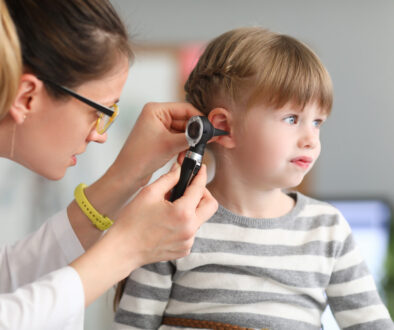Important Hearing Milestones for Your Baby
It’s adorable when your baby babbles and coos, but you may not realize your child is doing much more than being cute. These nonsensical noises are actually “practice” for developing the vowel and consonant sounds needed for speech development.
If your baby has a hearing problem, this practice doesn’t occur as it should, and your child may face social, academic and vocational difficulties. It’s vital to understand the important hearing milestones for your baby, and take action if your son or daughter is not reaching them.
How Hearing Problems Affect Baby’s Development
According to the National Institute of Health, 2 to 3 out of every 1,000 newborns in the U.S. have some detectable level of hearing loss. Early intervention is vital to ensure that these children won’t fall behind in schoolwork or vocabulary development.
Hearing loss affects children in four major ways:
1. DELAYED COMMUNICATION SKILLS
Children with hearing loss don’t learn vocabulary as quickly or as easily as their peers. Specifically, they have difficulty comprehending abstract words like “before,” “after” and “equal to.” Words such as “an” and “are” can also present problems.
2. ACADEMIC CHALLENGES
Children with mild to moderate hearing loss performed one to four grade levels lower than their peers with normal hearing, According to the American Speech Language Hearing Association. Children with severe or profound hearing loss often cannot progress beyond the third or fourth grade level without extensive intervention. Academic help is absolutely necessary for children to realize their full potential. Parental involvement is a vital part of this equation.
3. ISOLATION AND POOR SELF-IMAGE
Communication problems can lead to a profound and sometimes debilitating sense of isolation. Often, children with hearing loss report that they’re unhappy in school and don’t have many friends.
4. LIMITED VOCATIONAL CHOICES
Without help, children with hearing loss face limited vocational choices due to communication and academic challenges.
Is Your Baby at Higher Risk for a Hearing Loss?
Your child may be at greater risk for developing a hearing loss if:
- You have a family history of permanent childhood hearing loss
- Your child was in neonatal intensive care for more than five days
- Your child was exposed to an in utero infection
- There are developmental problems with the structure of your child’s face, head or ear
- Your child had a birth weight of less than three pounds
- Your child experienced any head trauma
- Your child has had any infections associated with hearing loss (such as bacterial and viral meningitis)
Your Baby’s Hearing Development Milestones
Even if your baby has passed the newborn hearing test, it’s important to remember these important hearing milestones, and track your son or daughter’s progress.
You may want to print this list and check off the items as they occur. Make notes about delays, and show this sheet to one of our ENTs, all of whom specialize in treating children.
BIRTH TO THREE MONTHS
- Reacts or awakens to loud sounds
- Turns toward interesting sounds
- Recognizes your voice or smiles when spoken to
- Coos and makes pleasure sounds
- Smiles when he or she sees you
THREE TO SIX MONTHS
- Follows sound with his or her eyes
- Pays attention to music
- Notices toys that make sounds
- Smiles when you speak
- Tries to imitate sounds, babbles
- Understands some words, like “bye-bye”
SIX TO NINE MONTHS
- Responds to name
- Uses both long and short groups of sounds (“tatata,” “upupup”)
- Says first meaningful words like “mama” or “dada”
- Listens when spoken to
- Responds to “no”
- Understands words for common items (cup, shoe, juice)
NINE TO TWELVE MONTHS
- Responds to simple commands like “come here”
- Enjoys games such as peek-a-boo
- Babbles to get attention
- Imitates different speech sounds
What to Do If Your Child Has a Hearing Problem
If you suspect your child has a hearing problem, schedule an appointment with one of our ENTs as soon as possible. The sooner you seek help, the better the chances for your child to achieve his or her full potential.
For more than 40 years, the physicians at Raleigh Capitol Ear, Nose and Throat, have served children throughout the Triangle area. We have extensive experience in helping infants and young children who have hearing loss. We want to be a partner in your child’s care, providing assistance and world-class treatment.
Raleigh Capitol Ear, Nose, and Throat is the area’s premiere physician-owned ENT practice with six convenient locations throughout Wake County. Our board-certified physicians have extensive experience in treating both common and complex cases to help adults and children alike. We offer six local ENT offices throughout Raleigh, Cary, Garner and Wake Forest. For more information or to schedule an appointment, contact us.




